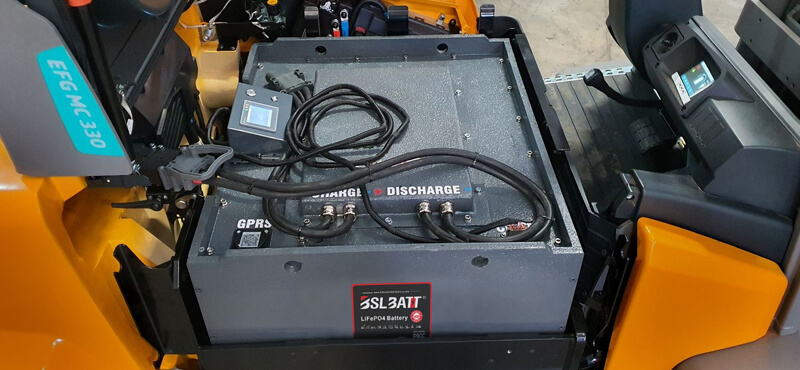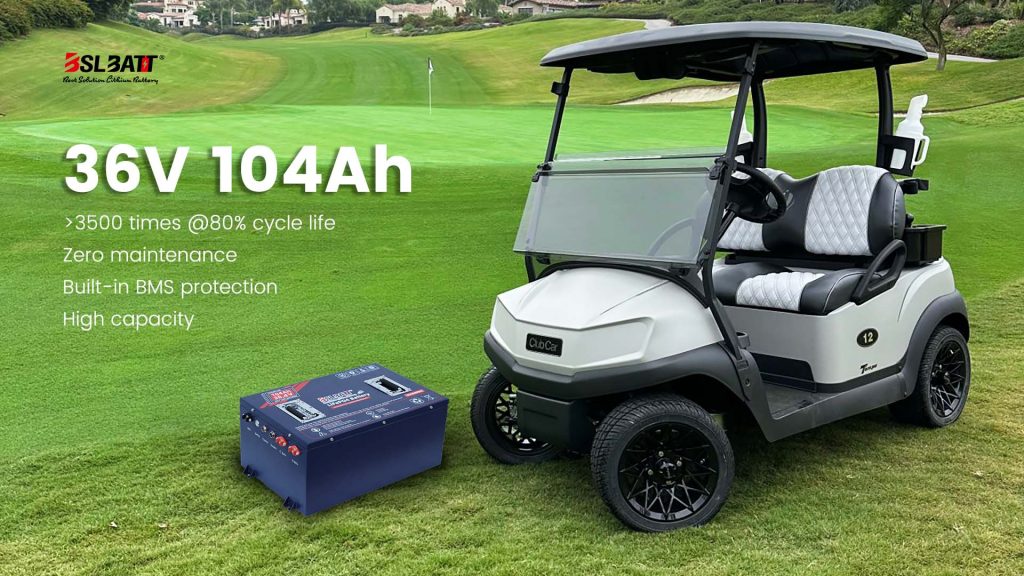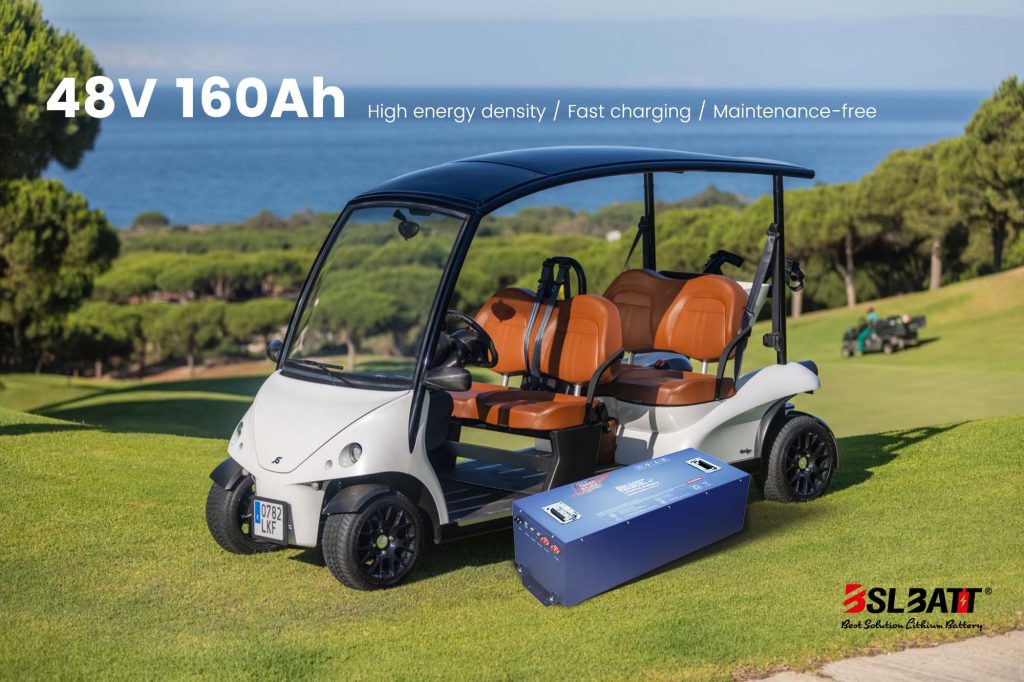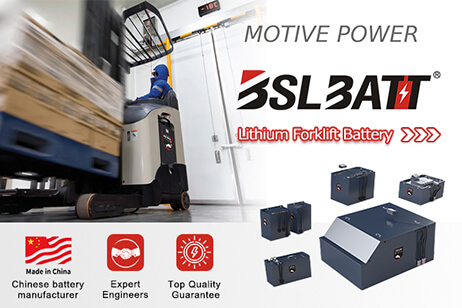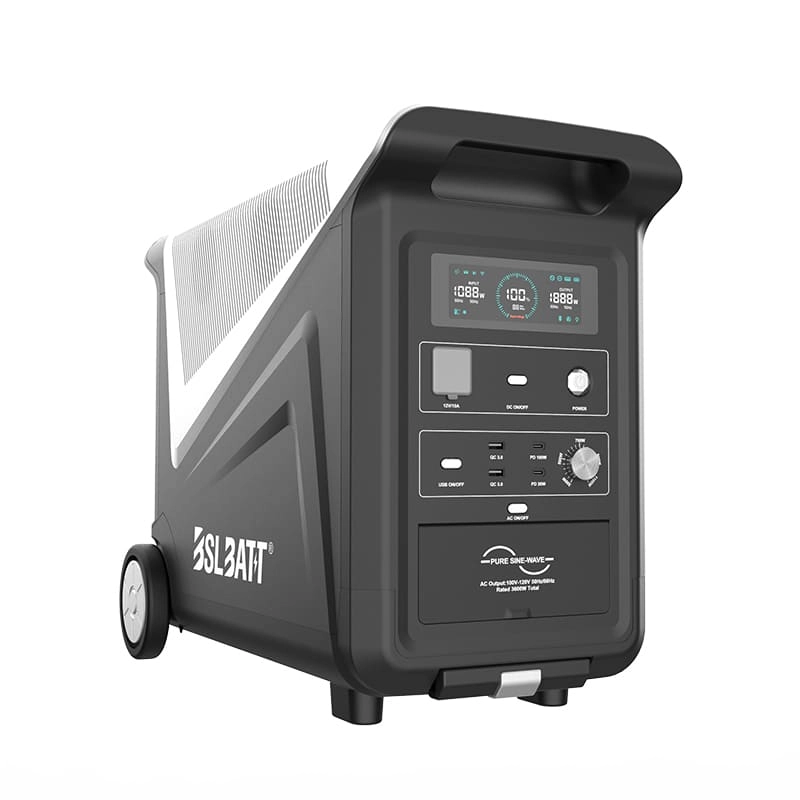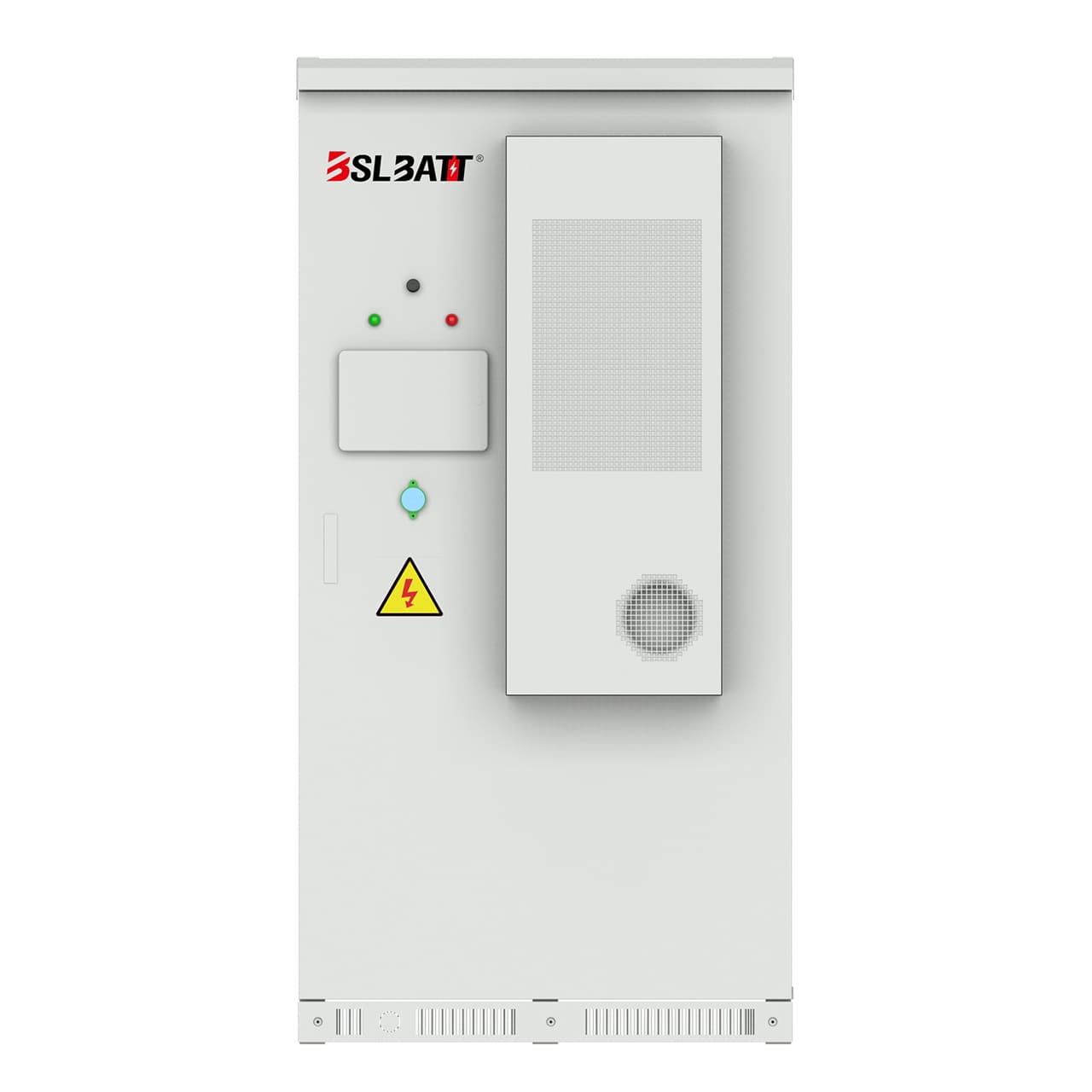Industry Application
Product Type
Why People Need A Lithium Battery For A Golf Cart?
A lithium battery is a crucial component for a golf cart due to several key reasons.
The golf cart battery industry is currently experiencing a period of instability. On one hand, golf cart manufacturers and retailers have recognized the superior performance and durability of lithium-ion batteries compared to lead acid batteries. On the other hand, consumers are hesitant to invest in lithium golf cart batteries due to their high initial cost, resulting in a continued reliance on inferior lead-acid battery options.
The incorporation of a lithium-ion battery into a golf cart offers significant advantages in terms of weight-to-performance ratio. Lithium golf cart batteries are half the size of traditional lead-acid batteries, reducing the overall weight of the battery by two-thirds. This lighter weight allows the golf cart to achieve higher speeds with less effort and carry heavier loads without experiencing a decrease in performance.
The disparity in weight-to-performance ratio enables the lithium-powered cart to accommodate two additional average-sized adults and their equipment before reaching its carrying capacity. Furthermore, lithium batteries maintain a consistent voltage output regardless of their charge level, ensuring that the cart continues to perform at its optimal level even when compared to its lead-acid counterpart. In contrast, lead acid and Absorbent Glass Mat (AGM) batteries experience a decline in voltage output and performance after utilizing 70-75 percent of their rated battery capacity. This not only negatively impacts the cart’s carrying capacity but also exacerbates the issue as the day progresses.
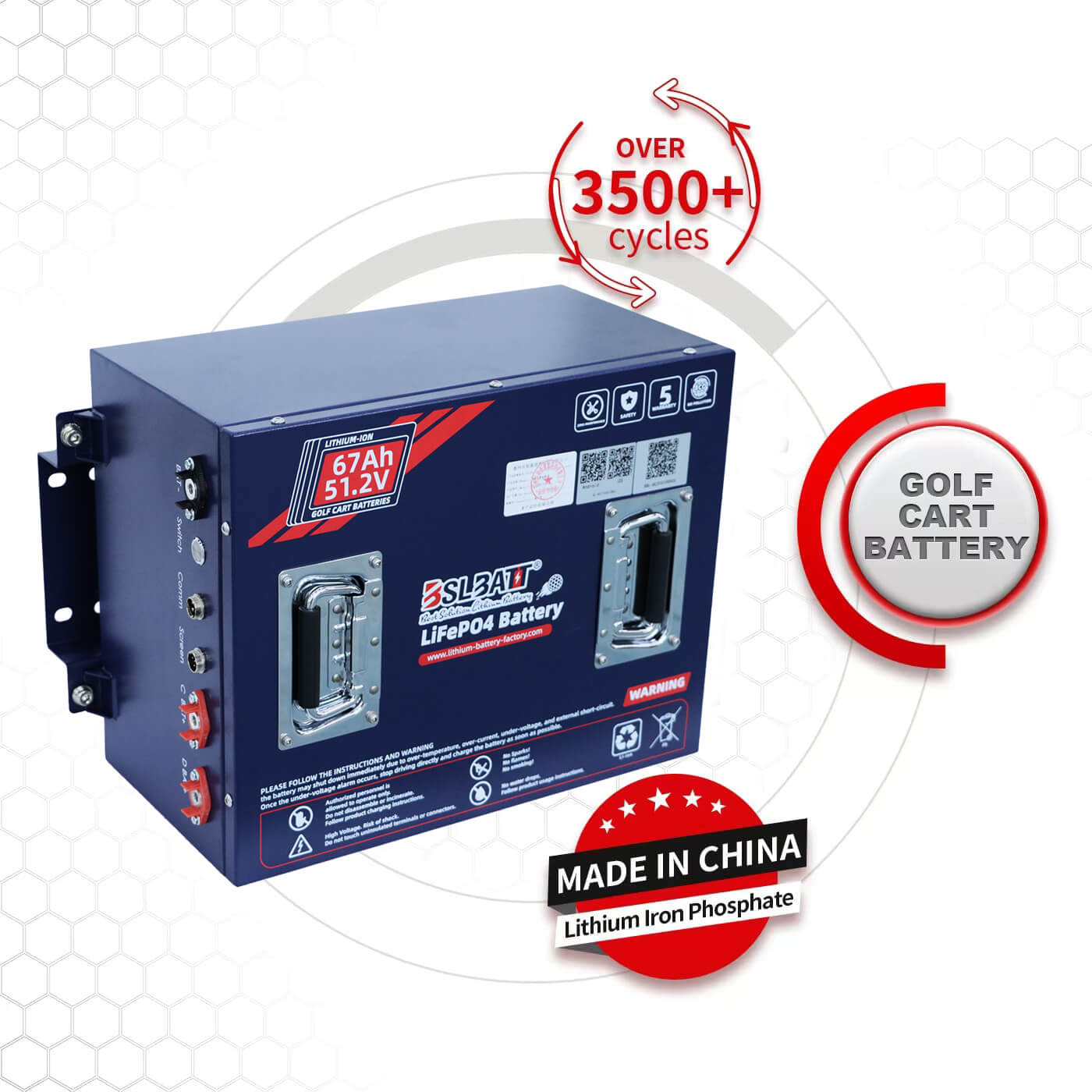
The origin of lithium-ion batteries
Until recently, electric golf carts have been powered by banks of four to eight lead-acid batteries, a technology that has been in existence since 1859. Despite significant improvements over the past century, this technology remains inefficient and outdated, particularly when compared to other rechargeable batteries. In fact, lead-acid batteries have the lowest energy density of all rechargeable batteries and exhibit poor performance in terms of temperature, cycling, and discharge rate.
In contrast, the first commercially available lithium-ion battery was introduced in the 1970s, with Sony developing the rechargeable version in 1991. Since then, significant advancements have been made in the electrolyte chemistry and stability of these batteries. As a result, a single lithium-ion cell can now perform the same functions as four or more cells of other battery types.
Lead-acid batteries operate by discharging hydrogen ions from a negatively charged lead electrode, facilitated by a solution of sulphuric acid and water in which both electrodes are submerged. Lithium-ion batteries, on the other hand, utilize a lithium compound in place of the lead electrode and one of several organic solvents in place of sulphuric acid.
Benefits of using lithium-ion batteries
Firstly, it lasts for a long period, providing users with reliable and consistent power throughout their golfing sessions. This is particularly advantageous as it eliminates the need for frequent battery replacements, saving both time and money.
Additionally, lithium batteries are known for being environmentally friendly. Unlike traditional lead-acid batteries, lithium batteries do not contain harmful chemicals, making them a more sustainable choice. By opting for a lithium battery, golf cart owners can contribute towards a cleaner and greener environment.
Moreover, lithium batteries are not vulnerable to power fluctuations. They offer a stable power supply, ensuring that the golf cart operates smoothly and efficiently. This is especially important during long rounds of golf, as a reliable power source is essential for an uninterrupted and enjoyable golfing experience.
Another benefit of using a lithium battery for a golf cart is the ability to achieve enough speed. Lithium batteries provide sufficient power to propel the golf cart at a desirable pace, allowing golfers to navigate the course swiftly and effortlessly. This ensures a seamless and efficient golfing experience, enhancing overall satisfaction and enjoyment.
Lastly, affordability is a significant advantage of lithium batteries. While they may have a higher upfront cost compared to traditional batteries, their long lifespan and durability make them a cost-effective choice in the long run. With fewer replacement costs and maintenance requirements, golf cart owners can save money and enjoy a reliable power source without breaking the bank.

Other Benefits of Lithium-Ion Batteries
Low Long-Term Cost
It is estimated that traditional lead-acid batteries currently dominate the power source for 90 percent of electric golf carts, low-speed vehicles (LSVs), and neighborhood electric vehicles (NEVs), despite the numerous advantages offered by rechargeable lithium batteries. The primary reason for this prevailing trend can be attributed to the significant drawback of lithium-ion batteries, namely their high initial cost. However, when considering factors such as performance and lifespan, it becomes evident that lithium-ion batteries present a much more cost-effective option.
Although lithium-ion batteries entail a higher price tag compared to standard batteries, they are designed to endure up to 5,000 charge cycles, each involving a complete discharge, whereas lead-acid batteries can only withstand approximately 500 cycles at an 80 percent discharge. Consequently, lithium batteries boast a lifespan that is up to ten times longer. With traditional batteries, or used golf cart batteries, replacement becomes necessary every two to three years. Conversely, with lithium-ion batteries, the need for replacement may never arise. In fact, the lifespan of many of these batteries surpasses the operational lifespan of numerous LSVs.
Improved Performance
Although a lower lifetime cost may be a primary motivator for most individuals to replace their lead-acid batteries with lithium-ion batteries, the latter also offers enhanced performance. Lead-acid batteries discharge at a slower rate as the charge depletes, resulting in a voltage output that is insufficient for operating a golf cart when they are still 20 to 30 percent full. This inefficiency drastically reduces the vehicle’s range on a single charge.
In addition to increasing a vehicle’s range, lithium-ion batteries also improve its speed and carrying capacity due to their smaller and lighter size compared to lead-acid batteries. Lithium-ion batteries are approximately half the size and one-third the weight of standard batteries. In a golf cart, this weight difference is equivalent to that of two average adults.
The reduced weight further increases the vehicle’s range, particularly when driving uphill or on rough terrain, and prevents the golf cart from tracking through or damaging wet grass. Additionally, a lighter vehicle places less stress on the brakes, improving braking distance and extending their lifespan.
The performance gains are remarkable. Many golf course managers have found it necessary to equip vehicles with electronic governors to regulate speed and acceleration. Golf carts that previously struggled to reach speeds of 24 mph were suddenly able to zip around at 31 mph.
Finally, lithium-ion batteries charge significantly faster than lead-acid batteries. The average time required to recharge a golf cart after 18 holes is eight hours. However, lithium batteries can reach 80 percent capacity in just one hour and achieve a full charge in only 2.5 to three hours.
Absence of maintenance
Lithium-ion batteries do not require monitoring of water levels, nor do they accumulate residue on their connectors or undergo corrosion.
Eco-friendly
Due to their prolonged lifespan and lack of degradation, lithium batteries do not necessitate frequent disposal or recycling.
Ensured safety
While earlier iterations of lithium batteries were susceptible to overheating, contemporary variants are equally secure, if not surpassing, conventional batteries in terms of safety.
The Application Area of the Li-ion Battery
One of the primary applications of lithium-ion batteries is in low-speed power vehicles (LSPs), such as golf carts, touring cars, and electric pickup trucks. With the advancement of electrification, automakers are increasingly turning to lithium-ion batteries to power their vehicles. The high power density of lithium-ion batteries enables quick acceleration and maintenance of high speeds, while also providing long distances on a single charge. Furthermore, these batteries can be recharged quickly, reducing downtime and making them an ideal choice for vehicles that are in constant use.
Another significant area of application for lithium-ion batteries is in renewable energy storage systems. As more homes and businesses adopt renewable energy sources like solar or wind power, there is a growing need for efficient and reliable energy storage solutions. lithium-ion batteries are well-suited for this purpose as they can store a large amount of energy in a relatively small space. Additionally, they can be charged and discharged quickly, making them suitable for use in grid-level energy storage systems.
lithium-ion batteries are also utilized in backup power applications, providing reliable power during power outages. These batteries can be integrated with solar power systems or other renewable energy sources to provide a complete backup power solution.
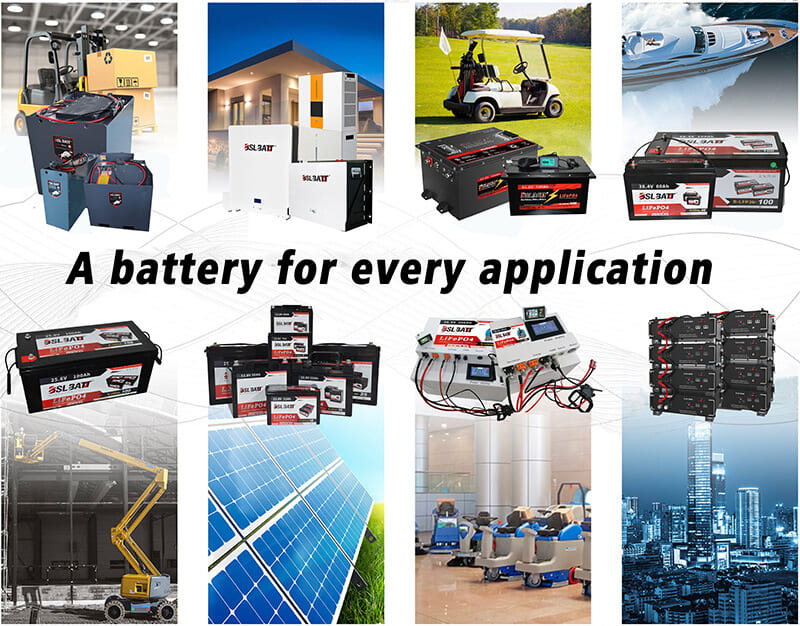
Work with BSLBATT
It is crucial for businesses and individuals to work with professional and trustworthy manufacturers for lithium battery purchases. BSLBATT is a reputable supplier that prides itself on providing best-in-class lithium batteries that are not only of superior quality but also adhere to the highest industry standards in terms of reliability and safety. BSLBATT‘s unwavering commitment to providing excellent customer support and competitive pricing makes it an ideal choice when looking for a lithium battery supplier. In addition, BSLBATT offers a wide range of customization options, allowing customers to tailor battery solutions to their specific requirements.
In conclusion
A lithium battery is an indispensable asset for a golf cart. Its long-lasting nature, eco-friendliness, immunity to power fluctuations, ability to provide enough speed, and affordability make it the ideal choice for golf enthusiasts. By investing BSLBATT lithium battery, golfers can enhance their golfing experience, contribute to the environment, and enjoy the convenience of a reliable power source.
A Guide to Choosing the Best 48V Lithium Golf Cart Battery
Would it be worth investing in a 48V ...
10 Exciting Ways To Use Your 12V Lithium Batteries
Back in 2016 when BSLBATT first began designing what would become the first drop-in replacemen...
BSLBATT Battery Company Receives Bulk Orders from North American Customers
BSLBATT®, a China Forklift battery manufacturer specializing in the material handling indust...
Fun Find Friday: BSLBATT Battery is coming to another great LogiMAT 2022
MEET US! VETTER’S EXHIBITION YEAR 2022! LogiMAT in Stuttgart: SMART – SUSTAINABLE – SAF...
Looking for new Distributors and Dealers for BSL Lithium Batteries
BSLBATT battery is a fast-paced, high-growth (200% YoY ) hi-tech company that is leading the a...
BSLBATT to Participate at MODEX 2022 on March 28-31 in Atlanta, GA
BSLBATT is one of the largest developers, manufacturers, and integrators of lithium-ion batter...
What makes the BSLBATT the Superior Lithium Battery for your Motive Power needs?
Electric forklift and Floor Cleaning Machines owners who seek the ultimate performance will fi...








